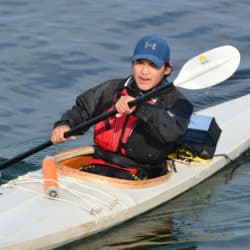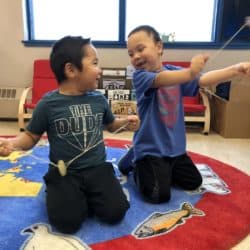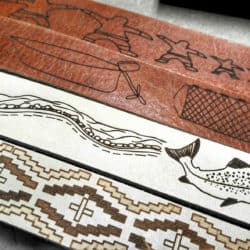While many traditional healing camps are established in remote wilderness areas, AIP laureate Arctic Indigenous Wellness Foundation’s camp is easily accessible for Yellowknife’s Indigenous population.
Donald Prince likes to share a story from the early days of the Arctic Indigenous Wellness Foundation’s healing camp:
“The day after camp opened, this guy shows up. A really hard guy – a prisoner. He came out and started making a fire. Then he made coffee and started telling stories. That was it. At the end of the day, he went back into town to the shelter. For him, though, it was a place he could come to and tell his stories. It kept him off the street and from drinking,” Prince recalls. “He ended up going into treatment and getting the help he needed. After he was done, he came back to work at the camp. He is now nine months sober. He has even reconnected with his family after 15 years and is rebuilding a relationship. This is just one story and there are many more like this.”
***
Canada’s Western-based medical system often fails to meet the needs of Indigenous people. In the Arctic, this situation is exacerbated by a lack of access to medical centres, specialists, and professional treatment. The overall approach of Western medicine as it is currently structured is to remedy “surface” issues and often does not address the root causes of disease for Indigenous Peoples, even while research has demonstrated that Indigenous populations in Canada experience disproportionate rates of diabetes, cancer, addictions, and suicide. In 2018, a group of Indigenous people in the Northwest Territories took matters into their own hands to lay the foundation for what would eventually become an on-the-land Indigenous wellness centre located just outside Yellowknife.
In 2007, the Government of the Northwest Territories had commissioned the Stanton Elders’ Council, a group of First Nations Elders from across the Northwest Territories, to work directly with the public administrator and management at the Stanton Territorial Hospital in Yellowknife. Their mandate was to recommend improvements in programming and services that would make the hospital more welcoming for Indigenous people. Over the years, patients at Stanton benefitted from the Elders’ advice on providing access to traditional foods and other services within the hospital. Unfortunately, as a result of the hospital’s transition to the Territorial Health and Social Services Authority, the government dissolved the council in July of 2016.
Concerned about the loss to the community, a Denesųłıné member of the Elders’ Council approached Dr. Nicole Redvers, a member of the Deninu K’ue First Nation, to ask for her support in continuing the idea of an Indigenous wellness centre in Yellowknife. Ideally, this centre would operate in close proximity to Stanton Hospital.
Redvers and two partners – Inuk Elder Rassi Nashalik and Sahtu Dene Elder Be’sha Blondin – proposed a new healing program leveraging what had worked from the original Elders’ Council but were unable to secure the support they needed to find a suitable location. An initial application for funding from the Arctic Inspiration Prize (AIP) was unsuccessful. Going back to the drawing board, they and other stakeholders realized they needed to visualize what the program would actually look like and where and how it would be delivered. In the end, they decided that a more traditional approach would be best suited – specifically, an on-the-land camp that would acknowledge the powerful relationship between Indigenous Peoples and the land, which, in addition to food, warmth, and shelter, provides spiritual guidance, ceremony, and medicines. Once again, however, lack of funding and location was a barrier.
The camp grew out of the need for culturally specific services for Indigenous people.
Donald Prince, AIWF
Knowing they needed someone with expertise in setting up and running the kind of program they envisioned, they approached Donald Prince to help pull together a team to move the idea forward.
Prince, who is Dakelh from British Columbia, had worked with the Government of the Northwest Territories since 2013. Prince landed originally in Inuvik, where he worked as a clinical supervisor, eventually moving to Yellowknife to work with addictions, mental health, and suicide programs. Before coming to the Northwest Territories, Prince had set up the first on-the-land healing camp in Canada, in BC in 1996, and had successfully set up and run many more.
With Prince on board, the next step was to register the project so the team could apply for funding. A board of directors was established, with Redvers, Blondin, and Nashalik as co-founders and Redvers as its chair. An advisory committee consisting of 23 Elders from the Northwest Territories and Nunavut would provide advice and direction. And so, the Arctic Indigenous Wellness Foundation was established in Yellowknife as a federally registered charity.
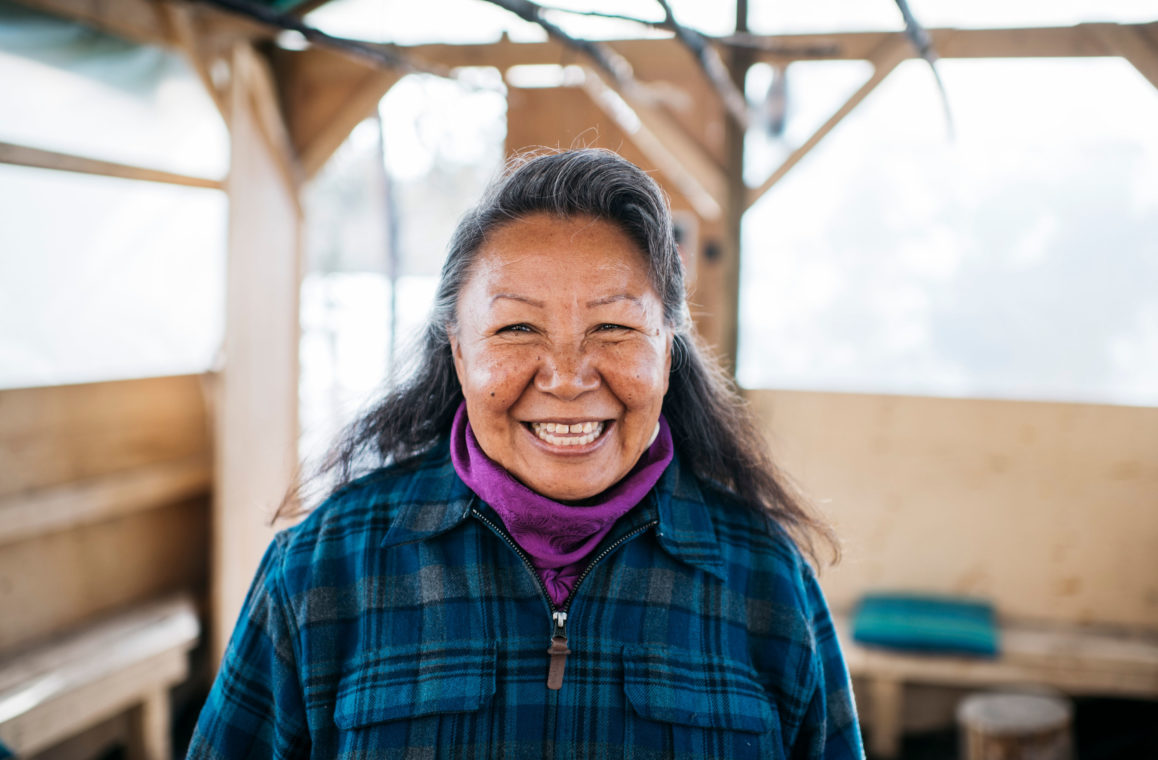
The initial plan was to provide healing services for Indigenous men living on the streets and those who were vulnerable to suicide and incarceration. While many on-the-land camps are established in remote wilderness areas, a camp close to the city would be easy for Yellowknife’s Indigenous population to access on a drop-in basis.
With a sound plan in place, the team once again set out to apply to the AIP for funding. This time the team reached out to Glen Abernethy, then the territory’s minister of health and social services and an AIP ambassador, to help them navigate the process. “I knew what it could do for the Indigenous people here and the community, and I was proud to be able to help them,” Abernethy says. “The AIP has the support available to help project teams pull together their nominations. There’s lots of support for anyone out there who would like it.” In his role as ambassador, Abernethy wrote letters and put the team in touch with the right people.
I knew what [the camp] could do for the Indigenous people here and the community, and I was proud to be able to help them.
Glen Abernethy, AIP ambassador
In 2017, the AIP awarded the Arctic Indigenous Wellness Foundation the $1-million prize for the AIWF’s plan to combine Indigenous cultural education with traditional therapeutic intervention in a wilderness/urban setting on the edge of Yellowknife.
With the funding in place, Prince and the AIWF board got to work, and the camp officially opened on April 25, 2018, just three weeks after the AIP funding came through. It was set up using traditional structures, including canvas tents and a teepee, wood stoves, and a cookout firepit; local traditional foods and tea are used where possible.
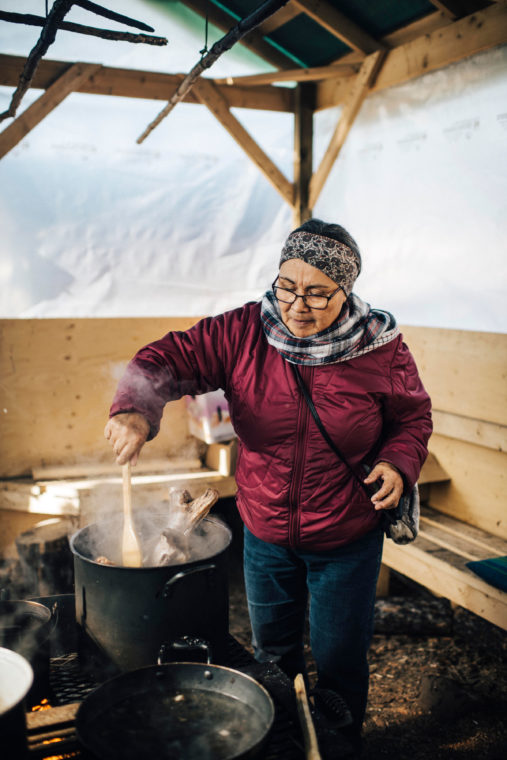
With the AIP funding in hand, other foundations and funders approached the project team. “With all the funding that came in, we were good for about two, two-and-a-half years,” Prince says. “The first year we received just over $900,000, and the second year we received $750,000 – all in addition to the AIP funding! We haven’t even had to touch the original AIP funding.”
“The money is not really the prize. The real prize is the awareness people have of you,” says Abernethy. “What the AIP offers is money that encourages more people to come to the table. It’s the flexibility of the AIP prize money that makes it unique. It means project teams have full control over the spending and there are no restrictions.”
“The money is really a catalyst,” he adds. “Other funders, who would normally never consider your project, now are offering money to you.”
***
You are safe here, you can talk here, you can listen here.
AIWF camp participant
“Although it’s on the edge of the city, each step down the path leaves the city behind: the sounds of traffic are replaced with the sounds of birds, the crunching of the grey gravel beneath my feet,” one participant shares. “My spirit feels lighter as I approach the camp. There is a feeling of peacefulness here. A place where you can feel the warmth of the fire on your face. The popping, crackling, and smell of the fire brings a calmness, a feeling of openness; you are safe here, you can talk here, you can listen here.”
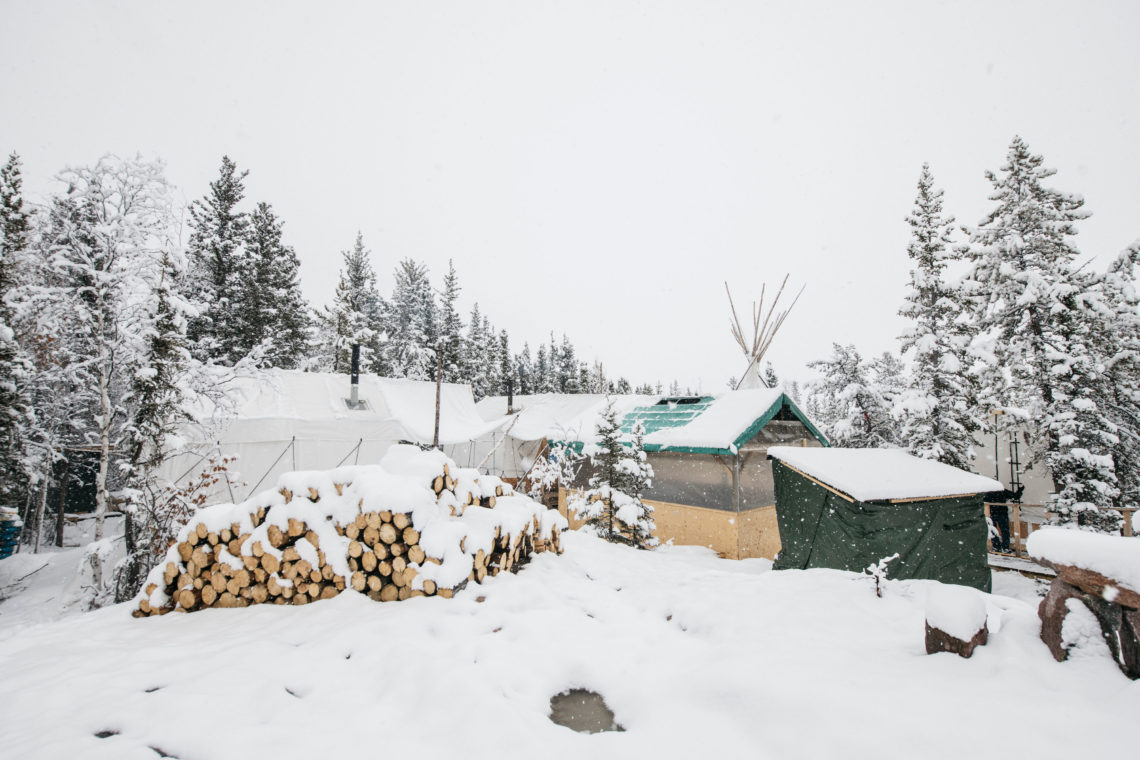
The camp quickly became popular. Soon, women and families started showing up. Responding to the need, the camp opened up to people of all genders and families in the community who were facing challenges in their lives. A range of programs have since been developed as a result, with a focus on developing cultural identity, helping clients cope with stress, and fostering a sense of community. A growing number of individuals and families now travel from remote communities in the Northwest Territories and even Nunavut to access healing services.
“This grew out of the need for culturally specific services for Indigenous people. [Addiction services are] coming from the government and southerners – neither of them, really, have any idea how to help Indigenous people,” says Prince. Eventually Prince set up a traditional sweat lodge, with access to Elders and traditional medicines.
What the AIP offers is money that encourages more people to come to the table.
Glen Abernethy
Non-Indigenous people expressed interest, wanting to know more about traditional counselling. The territorial government and other local organizations approached the AIWF to help teach their staff how to work with Indigenous families and what culturally relevant things they should be aware of.
“The Department of Justice started to bring people over – prisoners and youth from the youth treatment centre. They came to do drumming, singing, sewing – whatever. We have some very skilled people on the team who help,” says Prince. “The GNWT has four treatment centres, but none are in the North. I was on the National Native Alcohol and Drug Abuse Program board for a number of years, and I know how to get people to these treatment centres for free. I would make arrangements for people to get help. But people don’t want to leave their home to get help. They wanted to come to the on-the-land camp and stay for long periods of time to get the help they needed. For us, it is about helping people meet their needs, and meeting them where they are at. It is about cutting out the bureaucracy.”
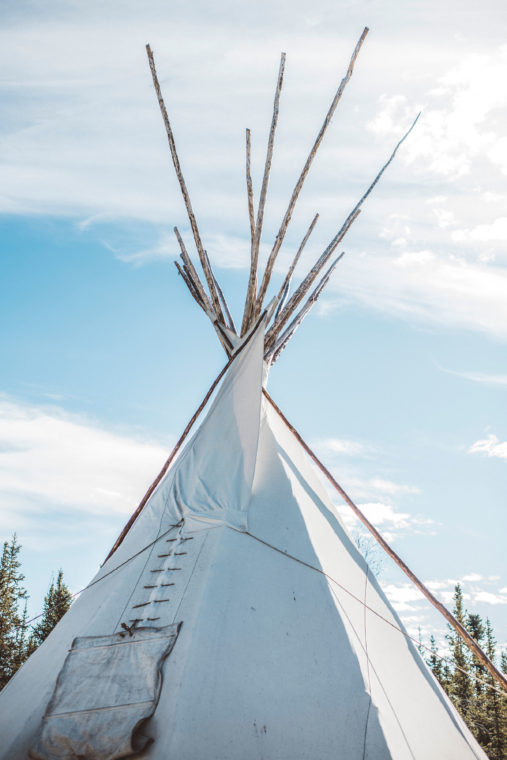
Once again responding to the needs of the whole community, the AIWF decided to offer programs tailored to meet the cultural training needs of specific organizations. “While we are still primarily focused on traditional counselling, be it one-on-one or for an entire family, we see this as an opportunity to help the community,” says Redvers. “We have worked with Aurora College nursing students who came out to learn about other ways of delivering health and training. We have worked with physicians as well as judges to support them with cultural training.”
“In addition to the traditional counselling, we also offer breakfast and lunch programs for those on the street,” Redvers says. (More than 91% of the homeless population in the Northwest Territories is Indigenous.) “Our focus is to do what we can to encourage them to stick around as opposed to go back to the street. We have even organized social events for the community. The outdoor-camp-style environment offers a light, social, and healing atmosphere for everyone to enjoy.”
We want First Nations Chiefs to take the idea back to their own communities and offer it to their own people.
Nicole Redvers, AIWF
The staff “are walking the talk,” one community partner says. “They are reliable, open to the community – not just the Indigenous community.” They are “making a place where all people from the North can feel safe and belong here, and if you want help, they can help you.” One student participant confirms that statement: “I love the feeling the camp gives, it is so safe … coming here you get a sense of peace.” Says another, “Finally, someone is listening to me … coming here has really saved me. I was on the verge of giving up … we can express how we really feel.”
The program also attracted the attention of many Chiefs from local First Nations, some of whom have visited to see how it is being run. “We want to inspire them to do the same, to take the idea back to their own communities and offer it to their own people,” says Redvers.
AIWF’s popularity, and a desire to expand programming, has resulted in capacity issues, so a permanent location is next on the vision board, ideally closer to the hospital. Realizing that dream has proven challenging, however.
“When Glen was the minister of health and social services, he helped us start the process of drafting a land lease by committing to make space for us on the Stanton Territorial Hospital [grounds],” says Redvers. “Unfortunately, since his departure, and with the impact of COVID-19, things have been stalled. It’s been frustrating, but we are committed. We have been developing designs for a new facility and actually won a $50,000 second-place international architectural award in Venice, Italy, for project design.”
***
Prince recently decided to retire and return to BC and has stepped down as program director. He has been replaced by Wilbert Cook (Sahtu Dene).
Glen Abernethy is now the AIP’s regional manager, a newly created position that is focused on recruiting and finding ambassadors/nominators throughout the North to support teams interested in being nominated for the AIP’s various prizes. The regional manager also works on behalf of the AIP trustees, who are all Northerners, to raise money from prize partners.
“The AIP is transitioning,” says Abernethy. “The focus is on ensuring direction comes from the North. We want to generate awareness and support as many projects as we can – we need to encourage northern people to submit their ideas!”
***
This year’s Arctic Inspiration Prize awards ceremony, on March 4, will celebrate the AIP’s 10th anniversary and will feature past laureates throughout the show.
